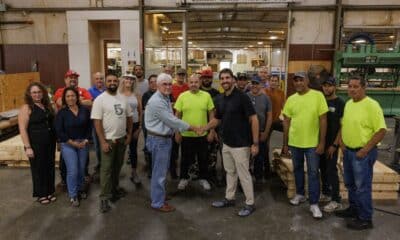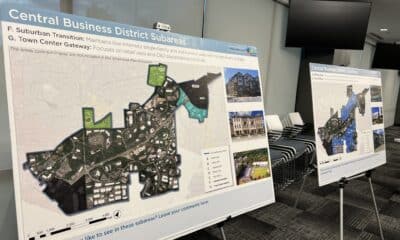Business
City as Living Lab
Published
6 years agoon

Intelligent vehicle test track brings the future, and the world, to Peachtree Corners
The little orange flags on stakes along Technology Parkway are modest harbingers of the huge change coming to the Peachtree Corners road.
The city is reconfiguring the road to create a 1.5-mile intelligent mobility test track that will be used to develop and test self-driving vehicles, intelligent mobility
Driverless vehicle testing is typically conducted in isolated research environments such as empty parking lots. But the test lanes on Technology Parkway will run alongside regular traffic, separated only by flexible bollards, or sticks, and interacting with vehicles and pedestrians at intersections.
“5G is a world of the future and we’re still trying to figure it out. So, testbeds and living labs like this … are absolutely vital to the growth.”
Cynthia Curry, director of IoT Ecosystem for the Metro Chamber
First announced a year ago, the research site is part of an economic development mission to help reinvigorate the technology park it winds through, Technology Park Atlanta.
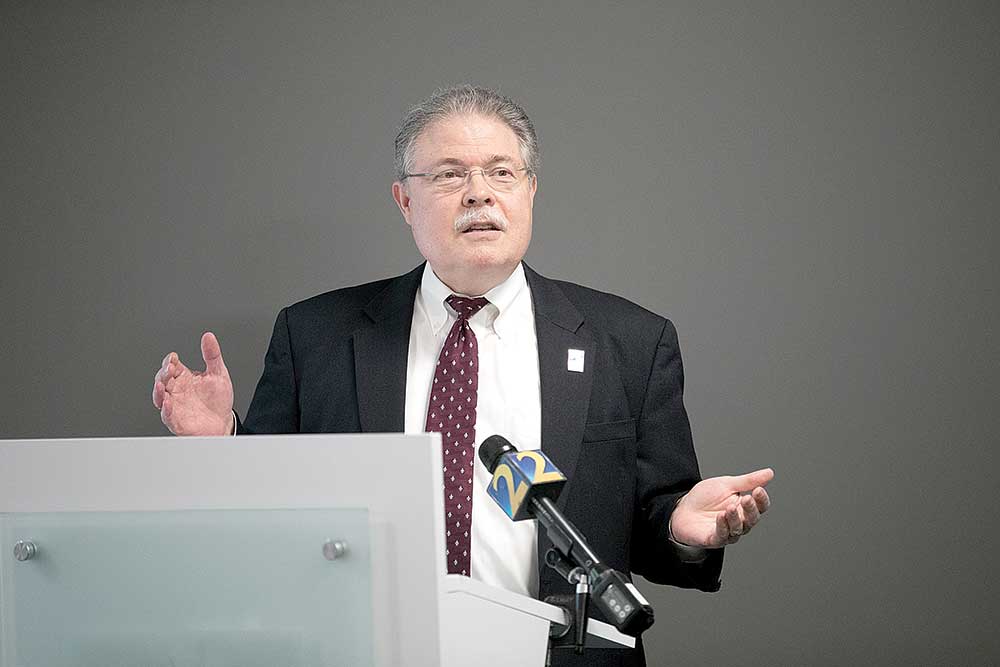
Photos by JASON GETZ/Getz Images
Mayor Mike Mason expects it do that and much more. “The short-term benefit is that it will provide
“Long-term, we see the Curiosity Lab at Peachtree Corners to have a ripple effect that expands well beyond our city limits to neighboring cities, counties, regionally and even statewide,” he said. “There is no other living laboratory like this in the state that is available for companies to research, develop and test their intelligent mobility concepts.”
Sprinting to Peachtree Corners
In January, communications giant Sprint signed on as a partner to the test track, bringing its super-fast, high-capacity mobile 5G to the city’s initiative and giving the site a trademarked name, “Curiosity Lab at Peachtree Corners.” 5G, the latest generation of cellular mobile communications, will provide the bandwidth needed to test vehicle-to-vehicle communication, vehicle-to-infrastructure communication
Curiosity Lab was first unveiled on Jan. 8 as one of three 5G, IoT partnerships announced by Sprint at the
“Sprint is bringing together Curiosity IoT, micropositioning and HD mapping, all enabled by our upcoming mobile 5G network, to develop and test the most advanced technologies in the industry,” Rook said, in the release. “We are honored to work with Peachtree Corners to drive AI, robotics and autonomous.”
Peachtree Corners officials showed
In an interview on the video, Rook says he is unaware of anything like Curiosity Lab. “What I love about Peachtree Corners is the fact that they’re bringing together a laboratory environment, an environment where companies can actually invest and try things out, but they’re marrying that with the real life,” Rook said. “So, this is the only initiative that I know where basically the test track meets the public road.”
Inquiries are coming
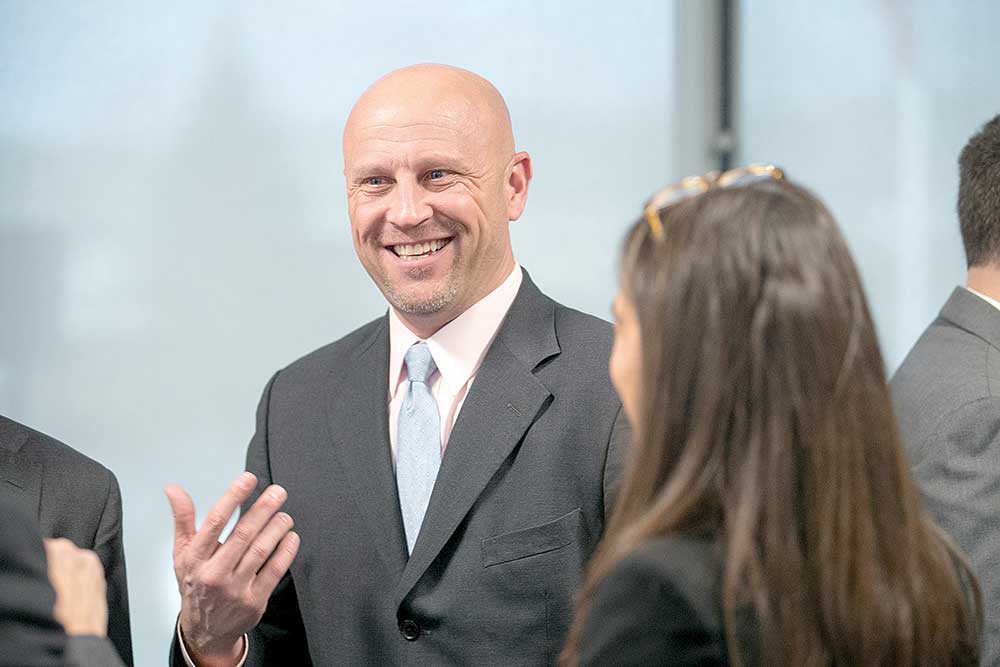
“People don’t realize — we didn’t until we got involved in this, too — there is a lot larger of an industry in the future to move goods by autonomous vehicles than people,” Peachtree Corners City Manager Brian L. Johnson said. “… All of this V2X, ’vehicle-to-everything,’ requires 5G because 4G does not have enough bandwidth to do this.” Vehicle-to-everything communication is the transfer of information between a vehicle and any entity that may affect the vehicle such as infrastructure, networks, pedestrians
How it all started
Incorporated in 2012, the city of Peachtree Corners is a planned community that began in the late 1960s, with Technology Park Atlanta, a low-rise campus for high-tech industries, at the core of its 17 square miles. “Companies, specifically tech companies, are the bedrock on which this city was formed from,” Johnson said.
Legendary tech pioneer and Georgia Tech grad Paul Duke proposed Peachtree Corners as a way to attract engineering firms to Georgia and keep Georgia Tech engineering graduates from leaving the state to find work. And today, “The city’s focus on technology is citywide,” Johnson said.
Like many other cities, Peachtree Corners deploys smart city technology such as sensors that can alert when a parking space is available and sensors in public trash cans that can report when they need to be emptied.
Technology Park Atlanta is now home to 49 technology companies, 18 biotech businesses
“We have about 45,000 people and about 45,000 jobs,” Johnson said. “It’s very rare for a city to be in a one-to-one ratio scenario. You’re usually considered to be a jobs hub … or vice,
Peachtree Corners’ robust business community is one of the reasons the city is able to have a full-service government that charges no city taxes, Johnson said. “Very few cities have no property tax,” he said, “and most of the ones that are like us are not near our size. … The healthier the [business] environment is, the healthier our non-business environment is.”
While the city’s origins are part of what led it to where it is today, the other driving force is the way Peachtree Corners approaches economic development, Johnson said. “
Becoming an innovation hub
In June 2017, the city approved plans to transform Technology Park Atlanta, commonly known as Tech Park, into a center for innovation.
“When we became a city in 2012, we didn’t inherit a high-tech hot spot. We inherited an aging, suburban office park,” Mayor Mason said, at the city’s Curiosity Lab press conference. “We knew that, and we were determined to change it, which led us to create the Innovation Hub Master Plan.”
The plan calls for research institutions, entrepreneurial training, professional networks, enhanced walkability, mixed uses
Parts of a multiuse trail have been completed in the area. And the 295-unit Echo Lakeside apartment complex was intentionally built within Tech Park to enable millennials — who tend to want to live near their jobs — to walk or bicycle from home to their Tech Park offices.
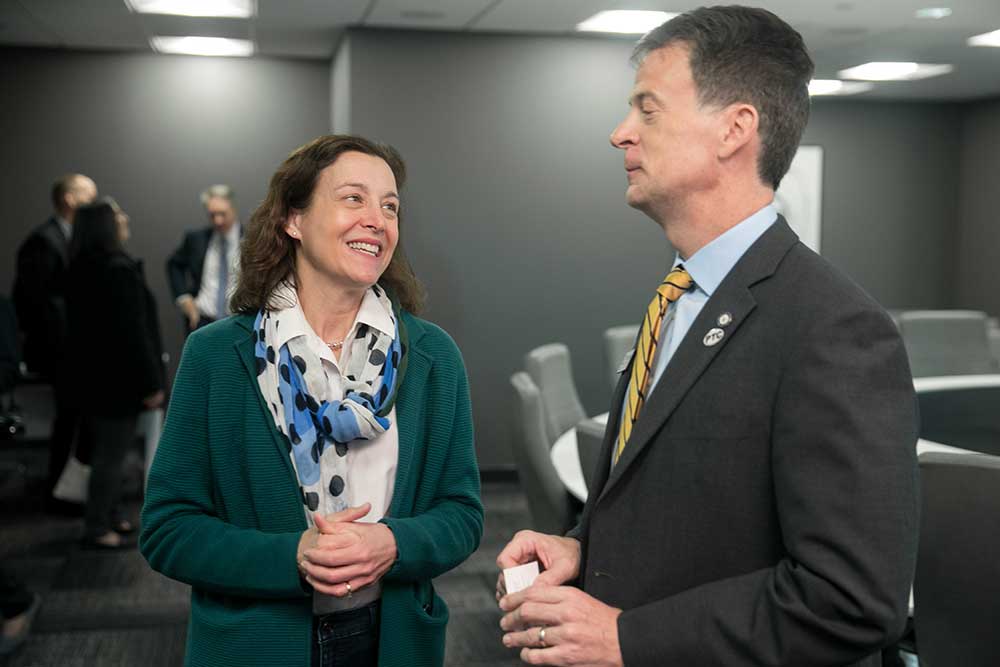
Betsy Plattenburg and City Councilmember Alex Wright
Prototype Prime
Curiosity Lab is the second step in the city’s master plan to re-establish Tech Park Atlanta as an innovation hub. The first step was the city’s 2015 creation of the 25,000-square-foot technology incubator, Prototype Prime, directly adjacent to Curiosity Lab, at 147 Technology Parkway.
The nonprofit supports
“Prototype Prime was an empty building and a concept that is now a job creator, an event space, and an educational site,” he said.
A regional affiliate of the Advanced Technology Development Center (ATDC) at Georgia Tech, it’s one of three incubators and business accelerators now operating in the city, all of which are located within Tech Park. The others are privately owned.
After Prototype Prime’s launch, the city decided it would be advantageous for the incubator to target a specific technology, Johnson said.
From there, things happened quickly. City Council members settled on intelligent mobility. Betsy Plattenburg, who worked at ATDC and is a senior consultant to Prototype Prime, suggested adding a research component.
The city announced the intelligent mobility test track last April, committing to a $2 million investment. And today, Prototype Prime is recruiting startups across the country who can be connected with corporate partners in the self-driving vehicle ecosystem.
After the Metro Atlanta Chamber of Commerce heard about the city’s intelligent mobility plans, Peachtree Corners representatives were invited to join the chamber’s delegation to the Smart City Expo held Nov. 11-15 in Barcelona, Spain.
Cynthia Curry, director of IoT Ecosystem for the Metro Chamber, spoke at the city’s Curiosity Lab press conference, saying it will provide vital opportunities for testing to move the IoT system forward and generate jobs.
“5G is a world of the future and we’re still trying to figure it out. So, testbeds and living labs like this … are absolutely vital to the growth,” Curry said. “We’re just thrilled to have this in our region. It helps us ensure and kind of reinforce our position as the number one state to do business. … I can’t wait to see what comes out of this, and I can’t wait to see all the companies that get to benefit from it.”
Plattenburg said Curiosity Lab has received significant interest from universities, Fortune 500 companies and startups from around the country who want to test emerging IoT technologies for smart cities, connected vehicles and other mobility concepts. “They are excited to discover that they can use the track and innovation space at Prototype Prime for as little as a few days or as long as a year — whatever it takes to move their technology from concept to market,” she said.
Coding schools, for adults and kids
One of the startups’ biggest needs is software engineers, according to Plattenburg. “Almost every tech startup needs to hire people who can code, and good talent is hard to find,” she said.
Web development employment is projected to grow by 15 percent between 2016 and 2026, according to the Bureau of Labor Statistics. Peachtree Corners is already planting the seeds to help fill some of those positions.
“In creating the innovation hub plan, the city realized that helping citizens train or retrain to fill open positions would be valuable for everyone and made a focused effort to provide local coding education,” Plattenburg said.
The Professional Education division of Georgia Tech was signed on to conduct a “Coding Boot Camp” for adults at Prototype Prime. Its first round of classes, which started in January, sold out. About 40 students take classes two nights a week and on Saturdays for 24 weeks.
They will team up to work in a simulated professional work environment, building complex projects and applications to bolster their portfolios. They’ll also have access to career services such as resume and social media support, technical interview prep and portfolio reviews. The program, with a price tag of $10,000, is designed for people who are currently working or want to change careers.
Prototype Prime will also host a STEM-related summer camp for kids that starts on June 10. Roswell-based Kids 4 Coding will offer coding classes and other technology-related activities for kids ages 7-16 at the incubator.
Other kids will be reached through the incubator’s just-announced partnership with Paul Duke STEM High School, a new school that opened in Norcross last fall. Mentoring and other opportunities will be provided “so students can see what’s next for the future generation of technology,” Plattenburg said.
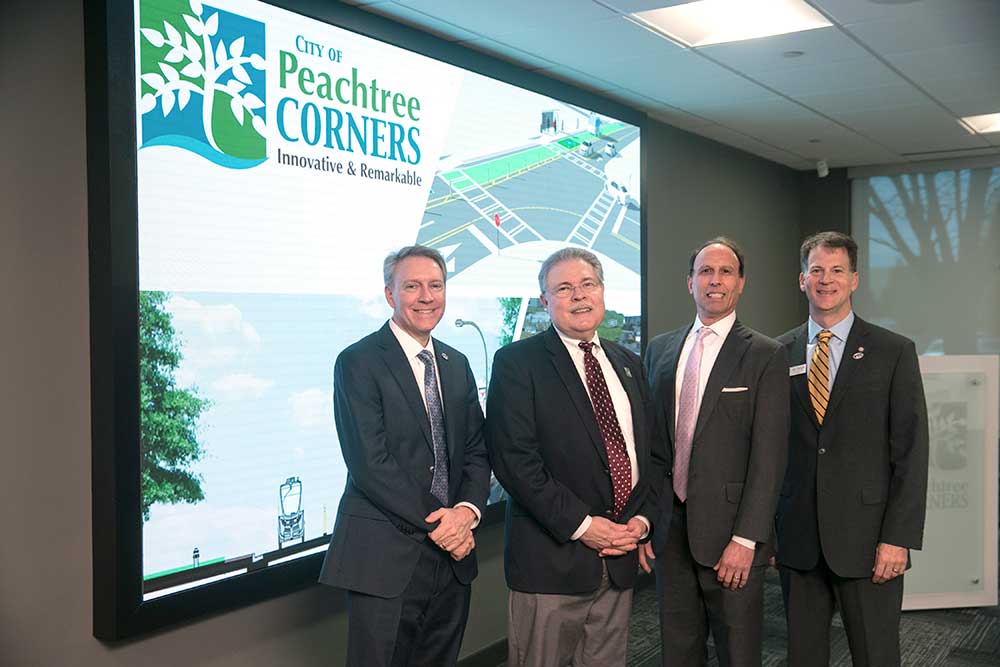
Phil Sadd and Alex Wright meet at City Hall during a January press conference where Sprint and the City announced their partnership on an intelligent vehicle test track which will feature Sprint’s 5G technology.
Photos by JASON GETZ/Getz Images
Curiosity Lab at Peachtree Corners
The city expects Curiosity Lab to take about four months to build. The track will run along Technology Parkway, from Peachtree Parkway to Spalding Drive.
Plans are underway for entrances to the site. “Later in the year, look for brightly painted lanes, digital signage and other visual cues that you are entering an innovation environment that will help to discover and define technologies of tomorrow,” Plattenburg said.
The test track is unique in that the city owns 100 percent of the roadway and right of way, she said. “What the city is creating out here on Technology Parkway is the opportunity for companies large and small to test things of the future and see how they will interact with people and with other vehicles, with traffic lights, with street lights, with everything that you would find in a city,” Plattenburg said.
Curiosity Lab will offer subject matter experts on site and will provide access to the 5G network to Prototype Prime startups. Existing companies in Tech Park will also be able to take advantage of 5G, getting it significantly ahead of the rest of the metro Atlanta, she said.
“We’re looking forward to Sprint helping our startups figure out how to utilize 5G,” Plattenburg said at the Curiosity Lab press conference, which was attended by Sprint IoT sales representative Steven Payne. Payne said Sprint is excited to partner with the city on Curiosity Lab.
“We’re looking forward to, over the next couple of years, not only the technologies that are born out of this park,” Payne said, “but just the innovations and the recognition and economic development it will bring to Peachtree Corners.” ■
Related
Donna Williams Lewis is a freelance journalist who covered metro Atlanta for decades as a writer and editor at The Atlanta Journal-Constitution.

Business
TransPak Acquires Reid Packaging to Expand East Coast Presence
Published
7 days agoon
October 16, 2024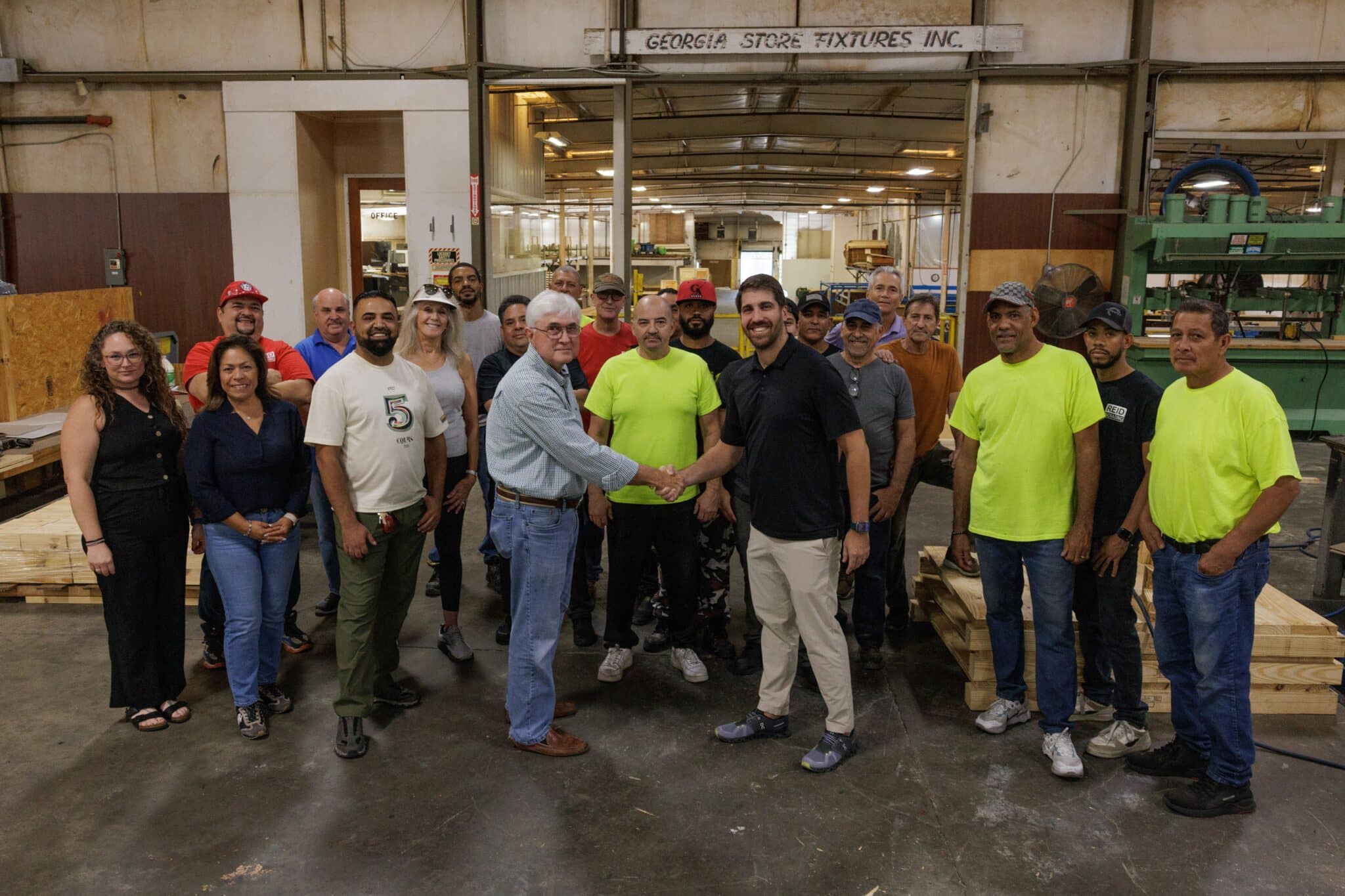
The strategic acquisition strengthens TransPak’s Southeast presence and expands their capabilities in custom packaging for military, aerospace and high-value equipment.
TransPak, a global leader in logistics, packaging and crating services, recently announced the acquisition of Reid Packaging, a long-standing provider of custom packaging solutions based in Peachtree Corners. Both family-owned and operated companies share a deep-rooted commitment to quality craftsmanship, reliability and customer service, making the acquisition a natural fit.
Reid Packaging, founded in 1982, has distinguished itself as the go-to customer industrial packager in the metro Atlanta region, providing corrugated, foam and custom-engineered crating solutions, particularly in the military and aerospace industries.
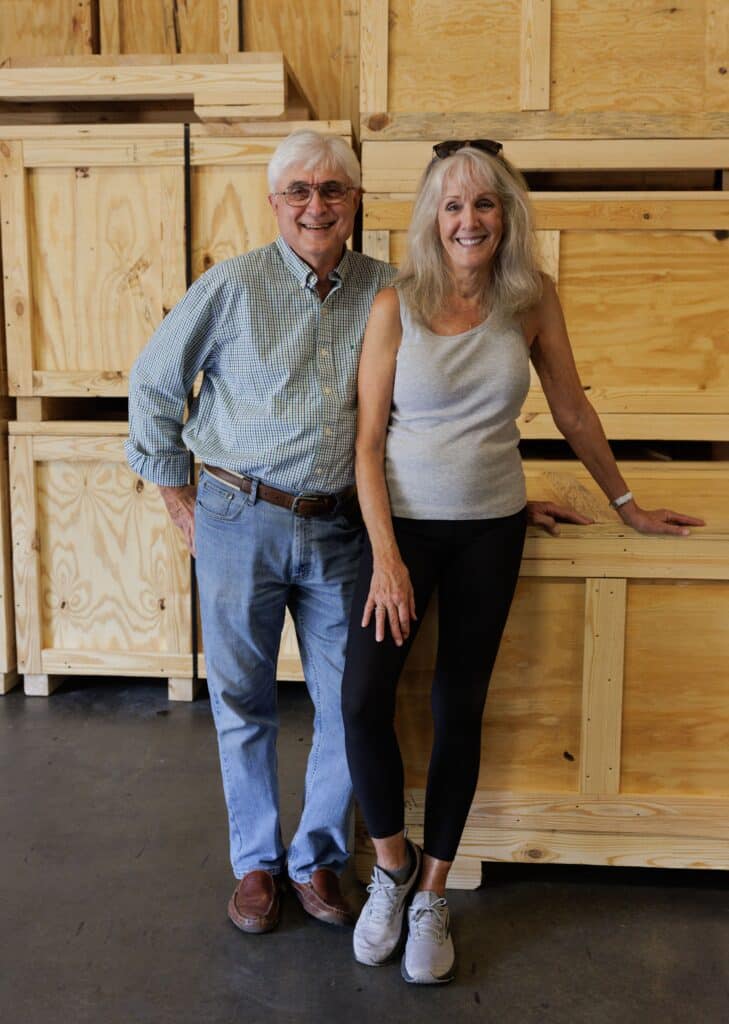
Under the ownership of Ward Phillips since 2008, the company has grown to become one of the largest packaging facilities in the region, with a 60,000-square-foot site.
The acquisition will allow TransPak to expand its local manufacturing capabilities in the Southeast, while leveraging Reid Packaging’s expertise in specialized and heavy-duty custom crates.
Strategic Atlanta location and enhanced capabilities
The acquisition is part of TransPak’s strategic expansion into the Atlanta market, a critical logistics hub for both the renewable energy and semiconductor industries.
“We’re thrilled to welcome Reid Packaging into the TransPak family,” said Tomas Molet, executive vice president of East and Midwest Operations, TransPak. “With Reid Packaging’s prime location in Peachtree Corners, we are now able to serve customers throughout the Southeast, including direct routes to the Carolinas and beyond. This acquisition strengthens our ability to meet the needs of existing clients, especially those in the semiconductor and renewable energy sectors.”
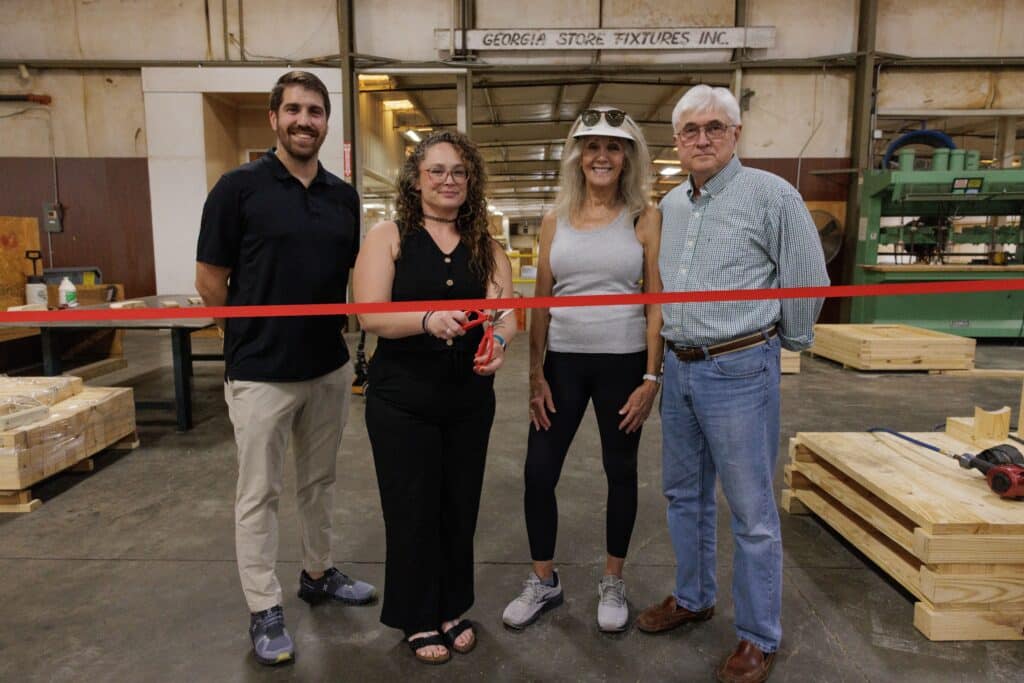
In addition to the strategic location, the acquisition brings new manufacturing capabilities to TransPak’s East Coast operations. Reid Packaging’s facility is now the largest of TransPak’s locations in the region. Its offerings include enhanced services, such as heavy-duty and triple-wall corrugated packaging, which will enable TransPak to meet the growing demand for custom-designed packaging solutions for fragile, high-value equipment.
Commitment to employees and leadership appointments
A key focus of the acquisition was ensuring a smooth transition for Reid Packaging’s employees.
“We made a commitment to Ward Phillips to take care of the staff, and we’ve delivered on that promise,” said Molet. “All employees were retained, and we’ve introduced benefits they previously didn’t have as part of our commitment to making this a positive transition for everyone involved.”
Amanda Gautney, a longtime member of TransPak’s leadership team, has been appointed as the operations manager for the Peachtree Corners facility. “I’m excited to work with the team at Reid and continue the legacy of this respected company,” said Gautney.
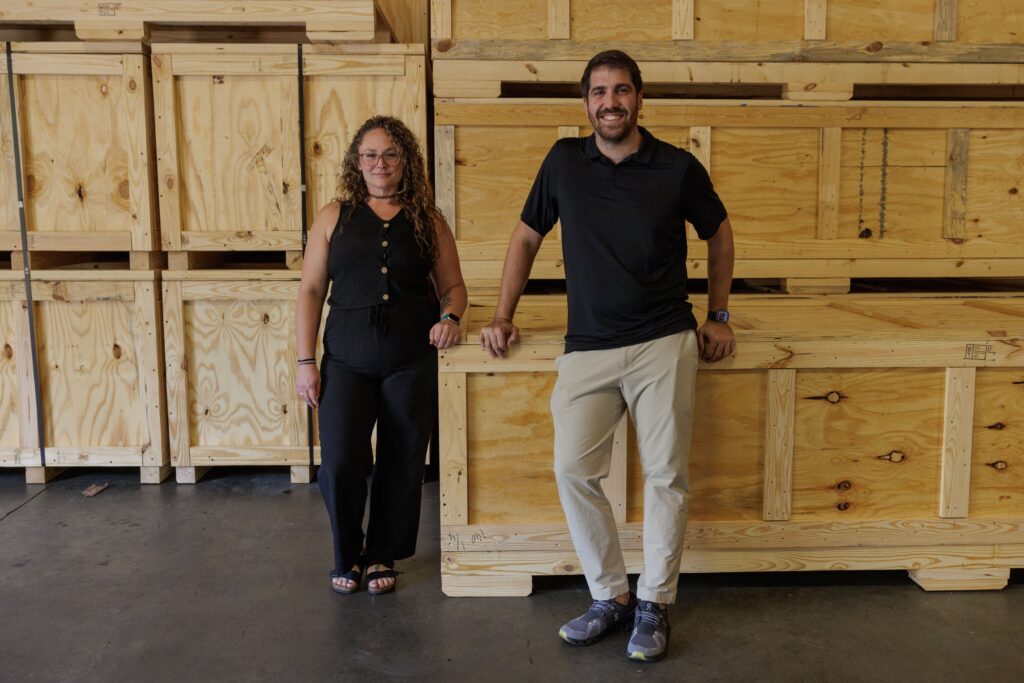
Looking forward in Atlanta
TransPak plans to continue operating under the Reid Packaging name for the immediate future. However, the facility will gradually transition to full integration under the TransPak brand, reflecting the shared values and commitment to quality of both companies.
About TransPak
Headquartered in Silicon Valley, TransPak has been providing innovative and cost-effective design, crating, packaging and global logistics for over 70 years.
As a customer-focused, women- and family-owned company, TransPak combines the agility of a small business with the reliability of a global powerhouse. TransPak lives by the slogan, “We make it happen,” ensuring that high-value, fragile, and oversized goods reach their destinations safely and efficiently.
For more information about TransPak, visit transpak.com.
Related
Business
Lisa Anders Promoted to Chief Operating Officer of Explore Gwinnett
Published
1 month agoon
September 17, 2024
Explore Gwinnett, the destination marketing organization for Gwinnett County, has announced the promotion of Lisa Anders from executive director to chief operating officer (COO). Since joining the organization in 1996, Anders has demonstrated outstanding leadership and has established a track record of developing partnerships essential to leading and expanding the evolving destination marketing organization. The creation and oversight of both the Gwinnett Film Commission and Gwinnett Creativity Fund are just two of her achievements.
“I am honored to step into the role of chief operating officer at Explore Gwinnett,” said Anders. “Over the past 13 years as executive director, I have had the privilege of witnessing remarkable growth for our destination. I am eager to enter this new chapter, and I’m looking forward to continuing to see how we expand.”
As COO, Anders will take on the additional responsibility of overseeing the Gwinnett Sports Commission. This division is dedicated to driving economic development through sports, managing a variety of events for youth, collegiate, amateur and professional athletic organizations. Ander’s innovative approach and extensive network of local and national connections will further support the commission’s overall mission to establish Gwinnett County as a premier sports destination.
“The Gwinnett Sports Commission team has excelled in attracting and managing a diverse array of sporting events over the past several years,” Anders added. “I look forward to working closely with this talented team to support their ongoing efforts and foster economic development for our community.”
For more information, visit exploregwinnett.org.
Related
Business
Peachtree Corners Resident Receives Entrepreneurial Spirit Award
Published
2 months agoon
September 2, 2024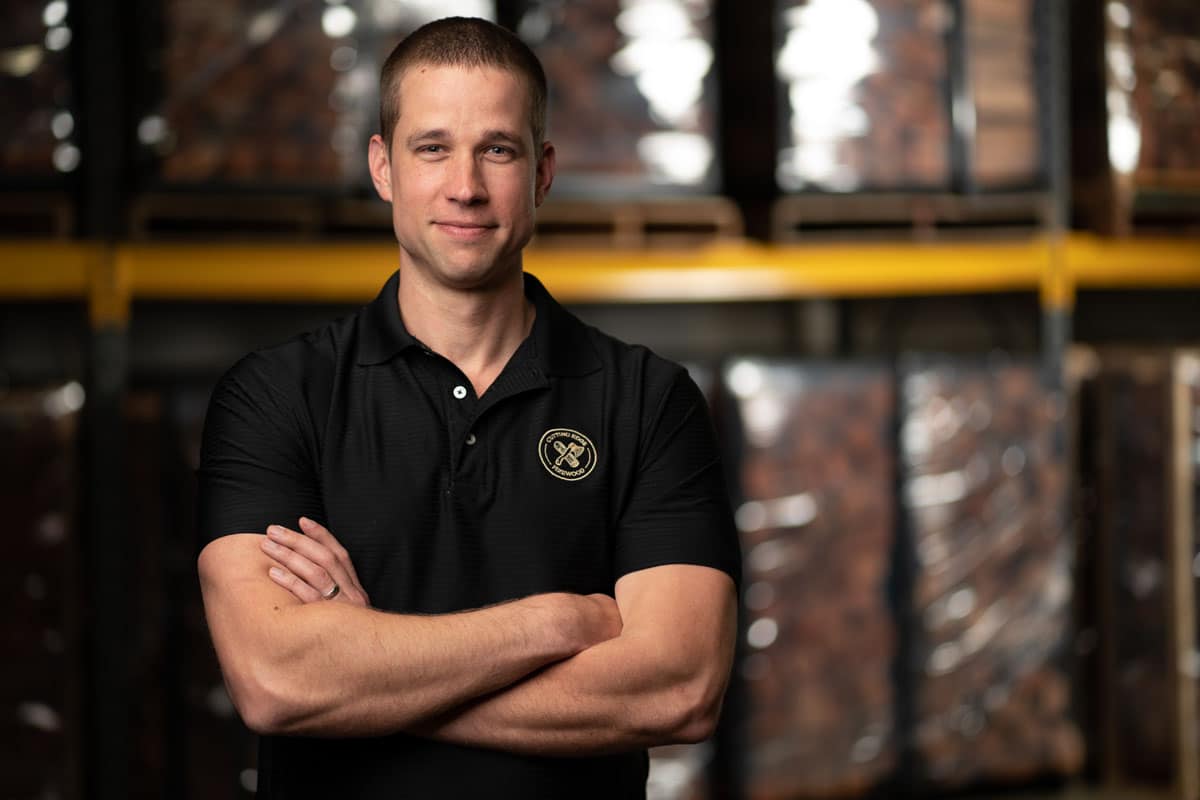
Leroy Hite, founder of Cutting Edge Firewood, was honored with the Distinguished Alumni Award from Berry College in August
Berry College recently awarded its annual Distinguished Alumni Award for Entrepreneurial Spirit to Leroy Hite, founder of Cutting Edge Firewood (and Berry College graduate, class of 2008). The annual award recognizes and honors alumni who have demonstrated a range of positive entrepreneurial skills — including a commitment to turning a dream into a reality, the vision to create an enterprise, the courage to assume risks and the ability to make changes and take advantage of new opportunities.
“This award holds a special place in my heart, maybe more than any other I’ve ever received,” said Hite. “Being recognized by my alma mater is incredibly meaningful to me.
My entrepreneurial journey began at Berry College. It’s where that initial spark was ignited, and honestly, I’m not sure I’d be where I am today without it. Berry nurtured my curiosity, drive and resilience — the key ingredients to entrepreneurship.”
Innovative entrepreneurship
Berry College professor and leader of the school’s Entrepreneurship Program, Dr. Paula Englis, said that Hite took every class she offered. And when those ran out, he did directed studies with her.
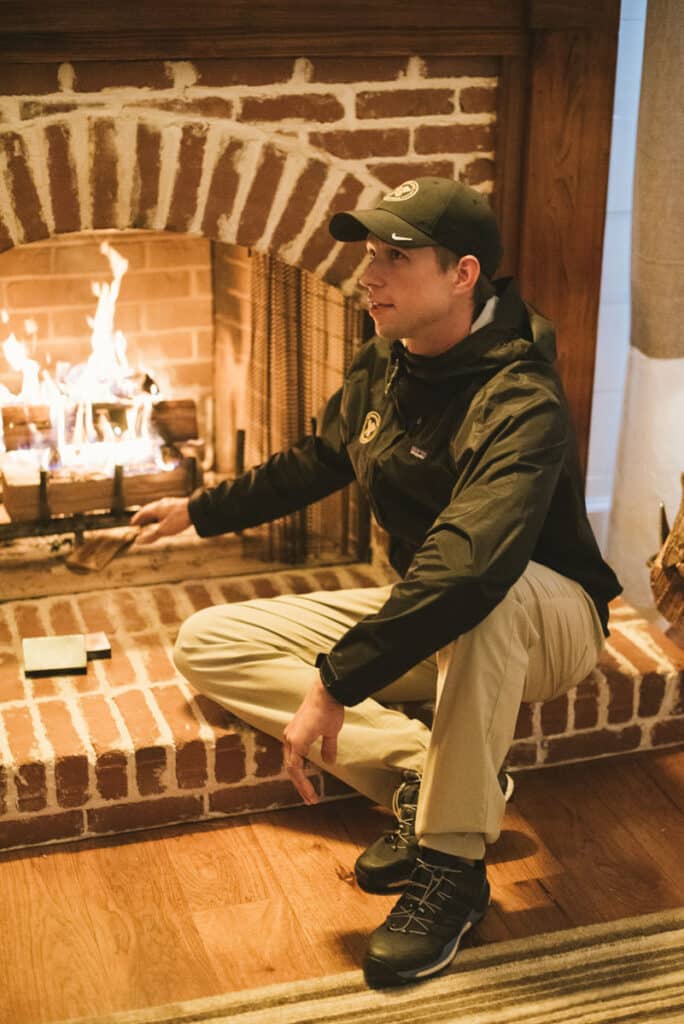
“He always knew he wanted to run his own business, and the growth and success of his firewood enterprise has been a wonder to watch,” she said.
Hite was nominated by Berry alumni Alison Ritter, class of 1994. Georgia Governor Brian Kemp also supported Hite’s nomination.
“As a small business owner myself, I have strong appreciation for and recognize the perseverance it takes to build a business from the ground up,” said Kemp. “Leroy’s innovative approach to the firewood industry, focusing on product quality and customer service, mirrors the entrepreneurial spirit that has long driven Georgia’s economic success.”
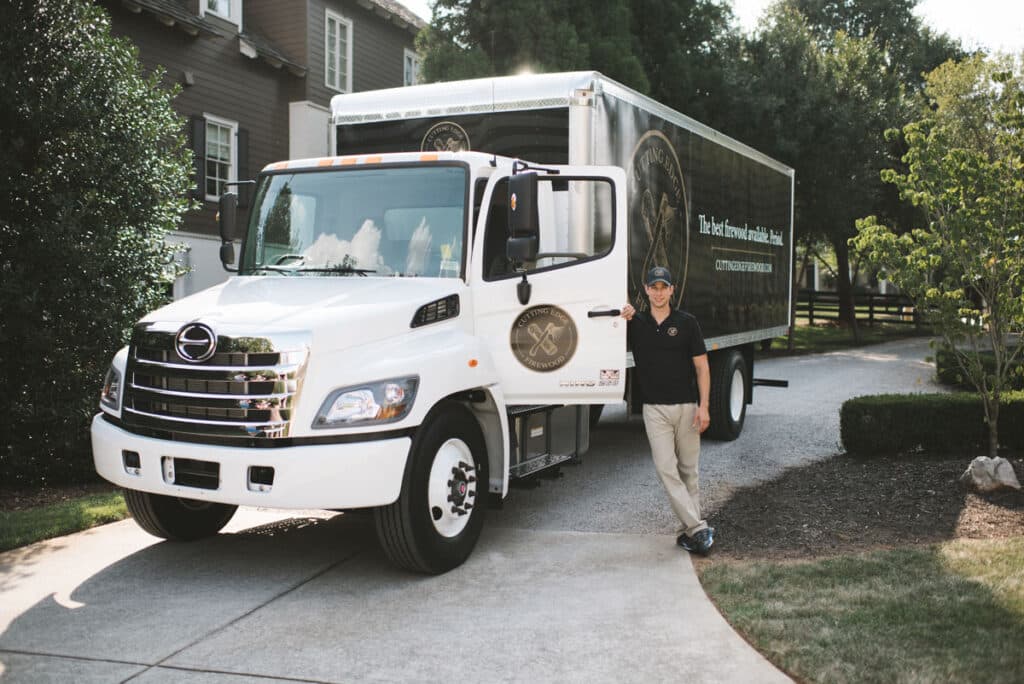
The company
When Hite founded Cutting Edge Firewood in 2013, he created the world’s first luxury firewood and cooking wood company. He reinvented everything about the firewood industry, from how firewood is dried and stored to how it’s packaged, shipped and delivered. When the company began, it was just Leroy with a one truck and a trailer. Now Cutting Edge Firewood employs 40, stocks enough inventory to fill its 40,000-square-foot Peachtree Corners warehouse and ships wood to all 50 states.
The wide variety of wood from Cutting Edge undergoes a special drying process to ensure that it’s free from unwanted pests, mold or fungus and provides an unmatched clean and bright burn with pleasant aroma. Their focus on process and the use of hardwoods such as oak, hickory, cherry, apple, pecan and maple ensures their customers receive the highest quality firewood, cooking wood and pizza wood possible.
For more information about Cutting Edge Firewood, visit cuttingedgefirewood.com.
To learn more about the Entrepreneurship Program at Berry College, visit berry.edu/academics/majors/entrepreneurship.
Related
Read the Digital Edition
Subscribe
Keep Up With Peachtree Corners News
Join our mailing list to receive the latest news and updates from our team.
You have Successfully Subscribed!

TransPak Acquires Reid Packaging to Expand East Coast Presence

Peachtree Corners City Leaders Engage Residents on Land Use Development

The NOW Massage Opens Peachtree Corners Boutique at The Forum

GCPL Accepting Applications for Next New Start Entrepreneurship Incubator

Ruwa Romman’s Re-Election Bid: Addressing Housing, Taxes and Transportation in Gwinnett [Podcast]

Councilmember Sadd to Host Town Hall Meeting on October 29

Councilmember Sadd to Host Town Hall Meeting on October 29

Ruwa Romman’s Re-Election Bid: Addressing Housing, Taxes and Transportation in Gwinnett [Podcast]

GCPL Accepting Applications for Next New Start Entrepreneurship Incubator

TransPak Acquires Reid Packaging to Expand East Coast Presence

The NOW Massage Opens Peachtree Corners Boutique at The Forum

Peachtree Corners City Leaders Engage Residents on Land Use Development

Pinecrest Academy Named to 2024 AP School Honor Roll

Michael Corbin on School Safety, Teacher Pay and Election Integrity [Podcast]

Light up the Corners [Video]

Capitalist Sage: Business Leadership in Your Community [Podcast]

Cliff Bramble: A Culinary Adventure through Italy

Top 10 Brunch Places in Gwinnett County

A Hunger for Hospitality

THE CORNERS EPISODE 3 – BLAXICAN PART 1

Top 10 Indoor Things To Do This Winter

The ED Hour: What it takes to Remove Barriers from Education

Peachtree Corners Life
Topics and Categories
Trending
-
Business7 days ago
TransPak Acquires Reid Packaging to Expand East Coast Presence
-
Land Use and Development1 week ago
Peachtree Corners City Leaders Engage Residents on Land Use Development
-
Health & Wellness1 week ago
The NOW Massage Opens Peachtree Corners Boutique at The Forum
-
Community4 days ago
GCPL Accepting Applications for Next New Start Entrepreneurship Incubator




